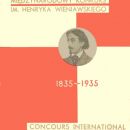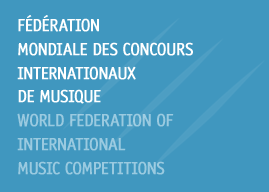INTERNATIONAL HENRYK WIENIAWSKI
VIOLIN COMPETITION
_________________________________________________________________________________________________
The Competition is a Founder-Member of the World Federation of International Music Competitions with a seat in Geneva:
The Henryk Wieniawski International Violin Competition arranged by the Henryk Wieniawski Musical Society in Poznań is a founding member of the World Federation of International Music Competitions (WFIMC) in Geneva. The federation was founded by thirteen international music competitions in 1957. Today the WFIMC has over 120 members – music competitions that meet the highest artistic and organizational standards. The members of the federation play an important role in discovering and promoting the most promising young talents in classical music and furthering their careers by presenting them before distinguished jurors, audiences and the media.
_________________________________________________________________________________________________
For eighty years Henryk Wieniawski has lent his name to international
violin competitions. The year 2016 will see the fifteenth edition of
the event held (since 1952) in Poznań. Expected to turn up are young
virtuosos of a new generation, ones already brought up in the globalized
world: oftentimes born in one country, educated in another, living in
still another, and daily exposed to the influence of varied cultures.
What unites them, however, is music, and, as always, the urge to
challenge their peers’ talents, technical skills and artistic
imagination. For the venue of this confrontation they chose Poznań –
the town that can boast the oldest violin competition in the world.
In 1935, to commemorate our patron’s 100th birthday, his nephew Adam, himself a composer, started international meetings of young violin players in Warsaw. The honour of opening the list of laureates fell to the Frenchwoman Ginette Neveu (First Prize), whose career was to end so tragically in an air accident, the Russian David Oistrakh (Second Prize), whose subsequent role in the world of the violin would be tactless to remind, and the Englishman Henry Temianka (Third Prize). The list of laureates also featured Ida Haendel, Bronisław Gimpel, Grażyna Bacewicz and several others, whose artistic plans were thwarted by the war; as was the course of the event which had just had such a fine opening.
Seventeen years later, owing to severe damage of the capital, the event was revived in Poznań, a town for several reasons singularly marked out for this role, and a favourite place with Wieniawski himself. And although in December 1952 only 23 violinists from 7 countries turned up for the competition, some of their names still move the music lover. The very young Igor Oistrakh (David’s son) won the event, with Wanda Wiłkomirska and the Russian Julian Sitkovietski right behind him (shared Second Prize). The 3rd Competition (1957, 45 participants from 16 countries and David Oistrakh on the jury), was a rivalry between the Russian Roza Fajn and the audiences’ favourite, the American Sydney Harth. In 1962 his compatriot, the phenomenal Charles Treger, was the undisputed winner. Five years later (1967) came the first victory by a Pole, Piotr Janowski. While the 6th Competition in 1972 was dominated by three female violinists: the Russian Tatiana Grindenko, the Japanese Shizuka Ishikawa, and the Pole, Barbara Górzyńska, the following edition in 1977 was monopolized by men: Wadim Brodski, Piotr Milewski and Mikhail Waiman. The next contest (1981) saw the legendary Henryk Szeryng at the head of the jury table, and total dominance by the Japanese players: besides Keiko Urushihara (First Prize), four more main prizes fell into their hands. The 9th Competition (1986) was the triumph of the Russian Evgeny Bushkov, while the jubilee, tenth edition (1991), with a record-breaking number of 54 participants, ended in a double victory by Poles: Bartłomiej Nizioł and Piotr Pławner. In 1996, however, the jury under honorary chairmanship of Yehudi Menuhin, did not find a personality worthy of the Gold Medal, and it was only the Second Prize that was awarded to the Japanese Reiko Otani.
The twelfth event (the first in the new century), the 2001 Wieniawski Competition opened a new chapter in its history. The organizers decided to entrust co-authorship of the programme and regulations, as well as composition of the jury to a celebrated violinist and educator of international repute, Shlomo Mintz. The artist indeed attracted a considerable group of over 100 talents, of which he himself selected 46 candidates for the competition; among them the subsequent winner, the 16-year-old Russian Alena Baeva.
The thirteenth edition drew on the experience of the previous event. Assisted by a group of domestic and international consultants, as well as the Board of the Wieniawski Society of Poznań, Konstanty Andrzej Kulka, one of the most illustrious Polish musical artists, prepared the competition. With Wanda Wiłkomirska and Bartłomiej Nizioł, who represent two, very different generations of the Competition’s laureates, and eight other international violin luminaries, he looked for young virtuosos most worthy of the Wieniawski 2006 laurel. First Prize was awarded to Polish violinist Agata Szymczewska.























